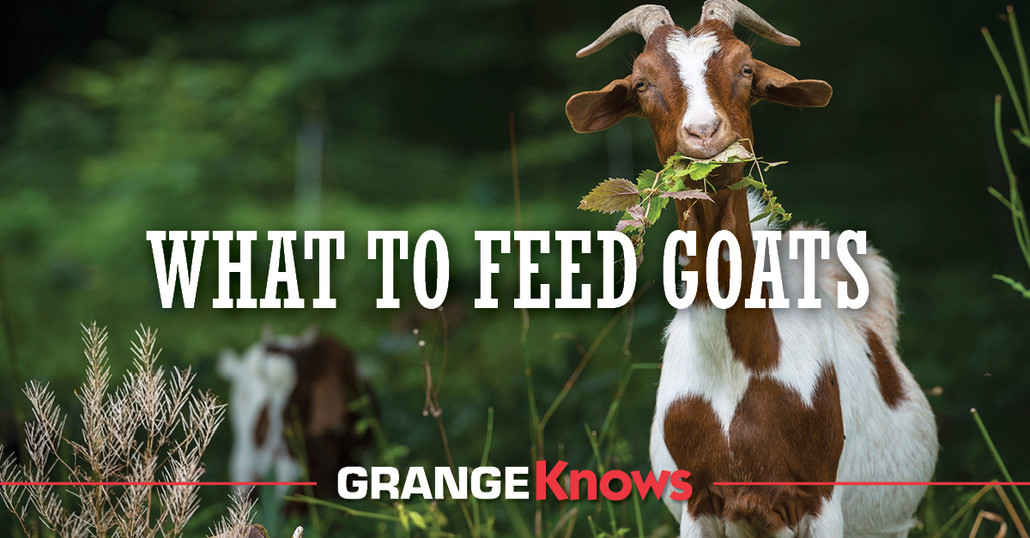
What to Feed Goats?
Posted by Grange Co-op on 19th Jul 2021
Goats are the only animals amongst ruminants who can consume almost all types of food, but that doesn’t mean that you should offer them your dinner. What to feed your goats is an important piece of information if you are planning on starting a goat farm, want to keep a few nanny goats for their milk, or enjoy them as pets. Either way, you need to ensure they are fed a proper diet so they may thrive.
Here are some of the top options that should be included in your goat feed:
Hay
As the main source of nutrients for goats, hay should be made available to goats when pasture forage is not in abundance, such as in the winter months. It can be clover, alfalfa or legume and you need to give about two to four pounds to each animal every day. This excludes what your goats forage for on the pasture. Feed hay to them twice a day.

If you don’t have access to a range or pasture, feed goats dry grass hay daily. The fibrous food is necessary for goats since it allows their unique digestive system to function properly, especially the rumen (i.e. the first part of the stomach), which is rich in bacteria, and works to digest the rough hay.
Out of all other options, alfalfa is the most popular for goats since it is rich in minerals, protein and vitamins. It is also a good source of calcium for milking goats.
Chaffhaye
Chaffhaye is a type of livestock feed made of grass/alfalfa which is mixed with molasses and bacillus subtilis. The feed is vacuum-packed. It is also fermented in a container in order to accumulate a lot of bacteria that facilitate the rumen.
Chaffhaye can often be used in place of hay and offers more nutritional benefits in comparison. A single pound of Chaffhaye goat feed is equivalent to about 100 pounds of hay.
Grain Feed
Grain feed, also known as food pellets, are often used as goat feed as it provides many of the minerals, vitamins and proteins goats need. The feed is often introduced to the grazer’s diet if there are multiple kids to feed or in adverse weather conditions when the goats need all of their strength.
However, despite its high nutritional value, grain feed should only be used to supplement regular goat feed, not replace it completely. Excess amounts can make your goats overweight, making them ill and can ultimately lead to death. We recommend speaking with a professional livestock nutritionist at Grange Co-op if you have questions on formulated feed that is going to offer the minerals and vitamins your goats need.

Grains
Whole grains are unprocessed and can be used with hay as goat feed as well. There are a few things you need to be aware of. Pelleted grains are grain byproducts that are converted into edible pellets via a binding agent. It is often medicated and should only be used under strict veterinarian instructions or it may prove harmful.
Minerals and Supplements
Just because you have a large range doesn’t mean your goats are getting all of the nutrients they need to be healthy and happy. It's important to also provide minerals in their diet that are essential for their growth.
These can be in the form of mineral blocks that can give them a steady supply of minerals and vitamins such as, phosphorus, sulfur, potassium, sodium, vitamins A, D and E. Besides this, the feed should also contain trace minerals such as, manganese, selenium, zinc, iron, iodine etc. To prevent urinary calculi which is an illness common in goats, make sure to feed them phosphorus and calcium as well.
What to Feed Goats as Treats
Treats are great, but think of them as dessert for your goats. These should be given in moderation as they can lead to urinary issues. However, an occasional treat can make your goats happy and motivated to come to you. Safe and healthy options include the following:
- Lettuce
- Carrots
- Bananas
- Celery
- Grapes
- Pumpkin
- Squash
- Pears
- Watermelon
- Sunflower seeds
- Apples
Make sure to cut the treats into pellets or bite-size pieces so your goats don’t choke on them. They WILL try to bite off more than they can chew if you aren’t careful when you are treating them.
What NOT to Feed Goats
A goat’s digestive system is quite complex and there are some plants that can aggravate it. While they are smart enough to avoid toxic plants, mistakes can prove fatal especially if they are dependent on you for their food.

Some plants can be poisonous in excess especially for kids which have a more sensitive digestive system compared to adult goats. Some of the plants you shouldn’t introduce in goat feed include the following:
- Weeds such as redweed, milkweed and nightshade
- Berries such as inkberry, elderberry and China berries
- Certain types of grass such as Velvetgrass, Sorghum and Johnson grass
- Ferns
- Poppy
- Lilies
- Poison ivy
- Certain types of cherries such as Chokecherry
- Lawn shrubs such as Virginia creeper, rhododendron, Boxwood, oleander etc
- Corn cockle
Before changing your goat’s diet, make sure you don’t go overboard. Rather than replacing their feed completely, introduce hay or other new options slowly or their sensitive stomach will get upset. The slow pace will allow the bacteria in their rumen to adjust and digest the new feed properly.
The result will be happy and healthy goats who will live for years and provide a good source of meat or milk for your family. If you have questions, or for more additional information, visit us in-store to speak with a GrangeExpert or chat with us online.
